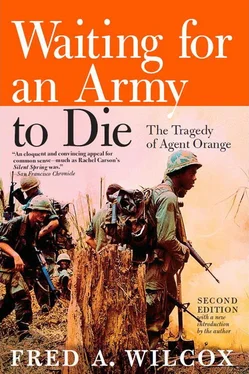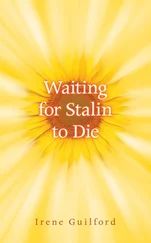Before Vietnam, said the veteran, he had “never even had an aspirin,” but since his return he has been given more than a hundred medications for skin rashes, stomach problems, urine in his blood, and inflamed kidneys. The VA, he testified, has written him off as a “hypochondriac.”
At the same hearings a Vietnam veteran’s wife made the following statement: “I am married to a Vietnam veteran who was a combat veteran in 1967 and 1968. We have two sons, a four-year-old and one who is four months. Our first son was born with his bladder on the outside of his body, a sprung pelvis, a double hernia, a split penis, and a perforated anus. The doctors are attempting to reconstruct the bladder and his penis. He has had five operations, and is due for a sixth operation in the fall. There is no way of telling how many more operations he will have to suffer through before the reconstruction is successful. The question of his being able to father his own children cannot be answered until he reaches puberty.
“We have met other Vietnam veterans and their families. We have met their children. We have seen and heard about the deformities, limb and bone deformities, heart defects, dwarfism, and other diseases for which there is no diagnosis… There are hundreds of children with basically the same problem, but in groups: so many bifidas, so many bone deformities, urological, neurological. But it is in groups of hundreds, not ones or twos.”
Another tragic aspect of having been exposed to Agent Orange, say veterans, is the fear they experience while waiting for their children to be born. What for centuries has traditionally been a time for rejoicing is all too often a period of prolonged anxiety and nervous tension for veterans and their wives. Many veterans, of course, have fathered perfectly healthy children, and those who worry that sensationalist journalism might encourage veterans or their wives to resort to sterilization have a valid point. But while the VA accuses the media of overreacting, it does not hire a competent staff of geneticists to counsel veterans, fails to do extensive testing of veterans’ fatty tissues to determine if they contain dioxin, and continues to insist that it will be 1987 before it can complete its epidemiological study.
“In the abominable history of war,” said Dr. Ton That Tung in 1970, “with the sole exception of nuclear weapons, has such an inhuman fate ever before been reserved for the survivors?” 6
A decade later a young mother whose daughter was born with sixteen birth defects testified before the US Senate Committee on Veterans’ Affairs about what has happened to many of the survivors of the Vietnam War. “Just as truly as the bullets and bombs killed on the battlefields in Vietnam,” said Maureen Ryan, “maiming thousands of our men, Agent Orange has come home from those battlefields with our men. It has come home to maim and kill additional thousands of men who naively thought they made it home safely. It would have been tragic enough if it had ended there.”
“But what the United States and what our Vietnam veterans did not know was that they carried home a tremendous legacy with them. They did not know that genetically on those battlefields were their children. So Agent Orange is now reaping an additional harvest of birth defects and cancers in our children and the men. We are losing our children through spontaneous abortions, through miscarriages, and perhaps most tragically in the surviving children, with the horrifying birth defects.”
Angered by the VA’s argument that it had not conducted an Agent Orange outreach program because it did not wish to confuse or frighten veterans and their wives, Ryan said, “It is not frightening when you are handed knowledge. It is much more frightening when you are kept in the dark. It is much more frightening to give birth to a child with birth defects. It is much more frightening to know your husband is dying of cancer.”
Summing up her testimony, Ryan told Senator Alan Cranston: “The echo of pain that you are hearing in this room may come off as a tremendous amount of bitterness. I don’t know whether bitterness is the right word so much as it is the level of frustration that has been reached. I think these people have lived private hells, and I don’t think we would be sitting here today if we didn’t believe in this country. What we are saying, though, is that the government is the people and the government has to stand behind us.” 7
As the age of five Lori Strait entered kindergarten. At seven she finished first grade, joined a square-dancing club, and played softball in a league for handicapped and retarded children. But Lori still wears a brace on her right leg, has only limited use of her right hand, and requires speech and occupational therapy. After the attention of nearly forty-five therapists and doctors, several stays in the hospital, and many thousands of dollars in medical expenses, Lori remains a handicapped child.
In spite of the pleasure they feel watching their daughter progress, the Straits are highly critical of their government’s handling of the Agent Orange tragedy. Why, they ask, is the government unwilling to do the kind of grass-roots research Dr. Tung and his colleagues are conducting in Vietnam? Rather than spending hundreds of thousands of dollars designing studies that may eventually demonstrate that veterans are ill, why doesn’t the United States send a team of medical doctors, dioxin experts, scientists, and dermatologists to examine firsthand the devastating effects of dioxin on human health? (Working out of mobile clinics the team could examine veterans and then make recommendations to the VA regarding a veteran’s claim for service-connected disability.) Why doesn’t the Department of Health and Human Services hire competent geneticists to examine the chromosomes and germ cells of every veteran who fathers a child with polygenetic birth defects? Perhaps most perplexing to the Straits is this: if Dow Chemical knew in 1965 that 2,4,5-T was contaminated with dioxin, and the US knew in 1962 that dioxin is toxic, then why were extensive scientific studies not conducted on the possible mutagenic, carcinogenic, and teratogenic effects of Agent Orange before it was used in Vietnam?
According to Thomas Whiteside, none of the manufacturers of 2,4,5-T did any formal testing on the chemical’s possible teratogenicity until after President Nixon’s science adviser, Dr. Lee DuBridge, proposed in 1969 that limited restrictions be placed on the use of the herbicide in the US and Vietnam. Dr. DuBridge’s statement was prompted by the results of a study conducted by Bionetics Laboratories of Bethesda, Maryland, which concluded that even in the lowest dose given, 2,4,5-T caused cleft palates, missing and deformed eyes, cystic kidneys, and enlarged livers in the offspring of laboratory animals. The study was also important because, writes Whiteside, “the rat, as a test animal, tends to be relatively resistant to teratogenic effects of chemicals.” 8
Although the study was conducted in 1965, its findings were not released until a member of Nader’s Raiders discovered a preliminary report submitted to the Food and Drug Administration by Bionetics Laboratories. The report’s conclusions were passed on to Matthew Meselson, Arthur Galston, and other scientists, who then demanded to know more about the study, including why the Bionetics Laboratories did not release its findings sooner. The manufacturers of 2,4,5-T had failed to test its teratogenic properties because neither the Department of Agriculture nor the Food and Drug Administration required such tests.
“When I went to Vietnam,” says Jerry Strait, “I took my chances. I was a soldier and I knew what to expect. There was always the possibility that I would be killed or wounded, but I didn’t think my children would ever be a casualty of the war. And maybe it’s too late for me, the damage has been done and whatever happens just happens. But I still wonder about our future generations. What about all the kids who didn’t have anything to say about all this? The chemical companies insist that it’s all a ‘legal issue.’ But I think that putting something into the air and water that will maim future generations isn’t a matter of law. It’s a moral issue. Am I bitter about Vietnam? No, but I am bitter about the spraying and about what happened to Lori. To tell you the truth, I would go back if they asked me. I think most of my friends feel that way. But we want some answers about this thing, and we keep asking how the government can get any answers if it doesn’t ask questions.”
Читать дальше











